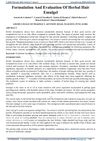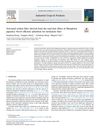 3 citations,
January 2018
3 citations,
January 2018 Amla oil may help treat hair loss.
 5 citations,
March 2005 in “Journal of The American Academy of Dermatology”
5 citations,
March 2005 in “Journal of The American Academy of Dermatology”  January 2019 in “Springer eBooks”
January 2019 in “Springer eBooks” Transplanting skin cells is a safe, effective, and affordable treatment for vitiligo.
 14 citations,
July 2019 in “Experimental and Molecular Medicine”
14 citations,
July 2019 in “Experimental and Molecular Medicine” Nanog gene boosts stem cells, helps hair growth, and may treat hair loss.
 5 citations,
January 2017 in “Journal of Nanomedicine & Nanotechnology”
5 citations,
January 2017 in “Journal of Nanomedicine & Nanotechnology” Nanoemulgel could be a promising new treatment for hair loss.
 February 2025 in “International Journal for Research in Applied Science and Engineering Technology”
February 2025 in “International Journal for Research in Applied Science and Engineering Technology” The herbal shampoo is a safer alternative to synthetic shampoos but needs more testing for effectiveness.
 January 2025 in “International Journal for Research in Applied Science and Engineering Technology”
January 2025 in “International Journal for Research in Applied Science and Engineering Technology” Eclipta alba promotes hair growth and supports liver health.
 May 2022 in “International Journal for Research in Applied Science and Engineering Technology”
May 2022 in “International Journal for Research in Applied Science and Engineering Technology” Eclipta prostrata has potential as a natural antibiotic.
 August 2021 in “Journal of Fundamental and Applied Pharmaceutical Science”
August 2021 in “Journal of Fundamental and Applied Pharmaceutical Science” Black tea extract at 5% concentration promotes the most hair growth.
 February 2020 in “Journal of emerging technologies and innovative research”
February 2020 in “Journal of emerging technologies and innovative research” The herbal hair emulgel was effective and stable for promoting hair growth, reducing dandruff, controlling hair fall, and preventing greying.
January 2016 in “Journal of chemical and pharmaceutical research” Angiopteris evecta extracts significantly promote hair growth in rabbits.
 December 2011 in “The Egyptian Journal of Histology”
December 2011 in “The Egyptian Journal of Histology” High-fructose diets can cause irreversible kidney damage.
 160 citations,
December 2016 in “Journal of biophotonics”
160 citations,
December 2016 in “Journal of biophotonics” Low-level laser therapy, now called photobiomodulation, is recognized for its broad medical applications and scientific backing.
 105 citations,
December 2009 in “Archives of dermatology”
105 citations,
December 2009 in “Archives of dermatology” A specific drug can help treat Lichen Planopilaris, a condition causing permanent hair loss.
 83 citations,
March 2015 in “International Journal of Dermatology”
83 citations,
March 2015 in “International Journal of Dermatology” ADSC-CM treatment improved hair density and thickness in women with hair loss, safely and effectively.
 75 citations,
January 2014 in “Archiv Der Pharmazie”
75 citations,
January 2014 in “Archiv Der Pharmazie” Jasmonic acid and its derivatives play important roles in plant health and have potential uses in medicine and agriculture.
 67 citations,
November 2002 in “Journal of The American Academy of Dermatology”
67 citations,
November 2002 in “Journal of The American Academy of Dermatology” The document concludes that careful evaluation is key to diagnose and treat women with hair loss, with tests for thyroid, iron, and hormones as needed.
 59 citations,
June 2008 in “Journal of The American Academy of Dermatology”
59 citations,
June 2008 in “Journal of The American Academy of Dermatology” The article explains the genetic causes and symptoms of various hair disorders and highlights the need for more research to find treatments.
 57 citations,
June 2003 in “American Journal of Physiology-cell Physiology”
57 citations,
June 2003 in “American Journal of Physiology-cell Physiology” Cyclosporin A helps mice grow hair by blocking a specific protein activity in skin cells.
 43 citations,
February 2020 in “Clinica chimica acta”
43 citations,
February 2020 in “Clinica chimica acta” Nano-sized plant-based chemicals could improve cervical cancer treatment by being more effective and causing fewer side effects than current methods.
 36 citations,
December 2002 in “Experimental dermatology”
36 citations,
December 2002 in “Experimental dermatology” Barley extract, specifically procyanidin B-3, can promote hair growth and counteract growth inhibition.
 24 citations,
June 2020 in “Industrial Crops and Products”
24 citations,
June 2020 in “Industrial Crops and Products” Activated carbon fibers from Metaplexis japonica seed hair are highly effective for removing the dye methylene blue from water.
 24 citations,
January 2003 in “Drug Delivery”
24 citations,
January 2003 in “Drug Delivery” Minoxidil-containing vesicles improve hair growth.
 21 citations,
January 2019 in “Elsevier eBooks”
21 citations,
January 2019 in “Elsevier eBooks” Green-synthesized nanoparticles can effectively target cancer cells, reducing side effects and improving treatment.
 17 citations,
July 2014 in “Expert Opinion on Biological Therapy”
17 citations,
July 2014 in “Expert Opinion on Biological Therapy” The new method for isolating stem cells from fat is simple and effective, producing cells that grow faster and are better for hair regeneration.
 14 citations,
January 2006 in “Skin pharmacology and physiology”
14 citations,
January 2006 in “Skin pharmacology and physiology” Procyanidin compounds from apples and barley promote hair growth and prevent hair cell death.
 12 citations,
January 2017 in “Skin appendage disorders”
12 citations,
January 2017 in “Skin appendage disorders” Two patients with skin lupus were mistakenly thought to have a different scalp condition but improved with lupus treatment.
 11 citations,
September 1997 in “Archives of Dermatology”
11 citations,
September 1997 in “Archives of Dermatology” Reduced androgens linked to kinky hair disorder and hair loss; 5a-reductase inhibitors may help.
 9 citations,
November 2019 in “Scientific reports”
9 citations,
November 2019 in “Scientific reports” The AC 2 peptide from Trapa japonica fruit helps protect hair cells and may treat hair loss.
 8 citations,
January 2021 in “Pharmaceutics”
8 citations,
January 2021 in “Pharmaceutics” Nanoporous silica entrapped lipid-drug complexes significantly improve the solubility and absorption of drugs that don't dissolve well in water.





























